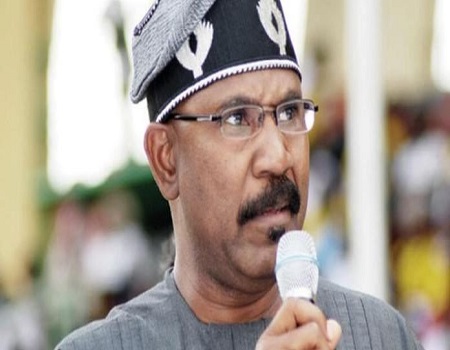The Federal Government on Monday assured Nigerians that it would place a travel restriction on some highly COVID-19 endemic countries if it becomes necessary and inevitable; even as it placed eight countries under a “high risk” endemic list.
Though, the Nigerian Government said the situation on ground now with just two confirmed cases- the Italian index case and the index case contact who was already discharged from hospital- does not warrant placing travel ban; it however assured that if it becomes inevitable, it would be announced immediately.
Speaking at a press briefing on the COVID-19 update in Abuja; Minister of State for Health, Dr Olorunnimbe Mamora, said the two-case situation in the country though important, but not as significant enough as to make us have travel restrictions.
But he added immediately that if the situation on ground dictates, a travel ban on some countries would be announced without delay.
Some of the highly endemic countries the travel restriction would affect are: China, Republic of Korea, Italy, Iran, Japan, Spain, France and Germany.
The Minister, who address the press briefing along with the Director-General, Nigeria Centre for Disease Control (NCDC), Dr Chikwe Ihekweazu, said: “Why are we not imposing travelling restriction? Again we have said it here in one or two occasions that each country would be at liberty to determine what restriction to put in place based on the experiences of that country as well as the reality on ground. We have just been able to confirm two cases and we cannot say that is not important, it is important but not as significant enough as to make us have travel restrictions.
“As the DG, NCDC has said, the situation is dynamic. The fact that we have not put in place travel restrictions today or at this point in time does not mean that even if the situation on ground dictates, we won’t do that; even before the end of the day if it becomes necessary that, that should be announced, that announcement would be made because we are monitoring, we are interacting with various bodies in the world.
“We also have the guidelines from WHO, things to look at with how best to handle the situation.
ALSO READ: [BREAKING] Coronavirus: CBN rolls out support measures
He also added: “You also mentioned the issue of travel restriction, I am sure the DG NCDC will talk more about that but for now, as I said earlier on, with the prevailing situation, the dynamics…, we have not said we won’t do it, we will do it if it becomes necessary, if it becomes inevitable. That is an assurance.”
Dr Mamora, however, warned that despite the fact that the country has not recorded a confirmed COVlD-19 case in the last one week, “it is important to remember that we are still at high risk like other countries.”
He promised that the government would continue to monitor returning travellers that fit the case definition and improve surveillance, detection and risk communications.”
According to him: “Following the declaration of a pandemic and increasing spread in countries, we carried out a review of our case definition. We have added three new countries to the existing list of five high-risk countries with widespread community transmission. These are France, Germany and Spain. Therefore, eight countries are in our priority list China, Japan, Iran, Italy, Republic of Korea, France and Germany.
“Travelers from these eight countries will undertake secondary screening at the point of entry. They are also advised to self-isolate for 14 days on entry.”
The minister pointed out that between the 7th of January and 15th of March 2020, a total of 48 people who met the case definition have been screened for COVID-19 in eight States; Edo, Lagos, Ogun, FCT, Yobe, Rivers, Kano and Enugu; out of which 47 were tested negative and have been cleared, one was positive (contact of the index case) and one result is pending. There has been no death.
He stated that the index case was clinically stable and has improved greatly, adding that “we are looking forward to progress early this week, to guide the medical team in discharging him.”
He also said: “In Enugu, a woman in her 70s returned from the UK and had symptoms of fever and mild respiratory illness. Her sample was collected for laboratory diagnosis and tested negative for COVID-19
“Therefore, as at the 15th of March 2020, Nigeria has recorded two confirmed cases of COVID-19. One case is now negative and has been discharged from the hospital.”
Giving a further update on response activities, the minister explained that the multi-sectoral Emergency Operations Centre (EOC) led by NCDC has continued to coordinate national response activities.
He said: “NCDC has developed guidance for mass gatherings. We have not advised against any closures or cancellations of large events. However, organisers must ensure that appropriate measures are in place such as temperature scanners, handwashing facilities etc
“An Interim case management guideline has been developed and disseminated to health workers. We are training health workers from all states, in stages. This has been completed in Lagos and Ogun
He advised Nigerians to discourage the spread of misinformation that causes fear and panic, adding that as this continues to increase, they should only rely on information shared through the official channels of the Federal Ministry of Health, NCDC or State Ministry of Health.
On the need for compulsory isolation for travellers coming from highly endemic countries, he said, “our position right now is to do more of self-isolation, supervised self-isolation; in which case we monitor.”
He added: “Don’t forget that the passengers, as they come in, they fill self-reporting form, which will indicate the status of their health, medication they are on, any symptom and of course all their travel history and all that. We do our screening at the point of entry, then visual observation and all that.
“But then, we don’t consider it very necessary at this point to now compulsorily isolate people, particularly when they have not shown any clinical features suggesting or suspicious of COVID-19. We still do this supervised self-isolation.”
He also enjoined Nigerians to be conscious of the contact with their phones and stressed the need to constantly wiping and cleaning handsets as parts of keeping hygiene.
The Minister also advised Nigerians to imbibe cashless transfers as the exchange of money and phones can lead to contact, especially as the country moves to curtail the spread of COVID-19.






